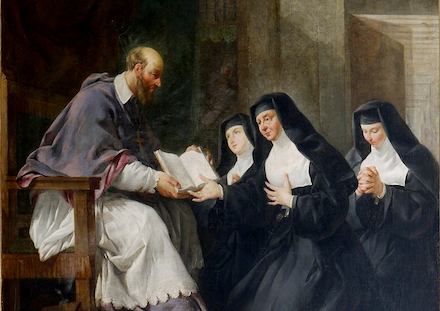40 Days-40 Ways to Mercy 5th Week of Lent - Forgive Injuries
Sometimes it's easy to forgive. Little annoyances, angry words, slights and miscommunication are part of everyday life. Most of us don't allow these to upset us. We move on without another thought about them.

Sometimes it's not easy to forgive. The hurts are deep, the anger is harsh, the slights are intentional and the wounds are intense. We feel betrayed, abused and heartbroken with grief at the loss of a relationship or confidence. We can't move on so easily. These hurts stay with us and slowly poison us. They can lurk in the depths of our hearts forever.

Jane's mother died when she was young, so she was raised by her father, the president of the Parliament of Burgundy, and leader of the royalist party.
Unusual for the time, Jane's father made sure that his daughter was educated. In 1592, at the age of 21, her father arranged her marriage to Christophe, the Baron of Chantal.
She quickly discovered that Christophe's estate was in disarray and near collapse. Because of her keen mind and education, Jane was able to restore it and make it viable once again.
Although it was an arranged marriage, Jane adored her husband and was very happy. They began a lovely family and the young couple had a vibrant social life, although she dearly missed him during his frequent absences in the service of King Henry IV.
There were rumors that Christophe had an eye for the ladies, and one of his trips resulted in a daughter. Jane could have been angry and bitter, but because of her deep love for God she chose to forgive Christophe and welcomed the child into her home to be raised as one of her own.
Christophe was so touched by her forgiveness that he changed his life and became entirely devoted to his family, as well as a deeply religious man.
Their happiness lasted nine years until one day when Christophe went hunting with a friend. His friend accidentally shot Christophe, mortally wounding him.
Christophe immediately forgave his friend, imploring him not to blame himself. “I’m dying, my dear cousin, my friend. I forgive you with all my heart. You didn’t mean it. . . . Don’t commit the sin of hating yourself when you haven’t done anything wrong.”
He sent for a priest and Jane who came running, even though she had just given birth two weeks earlier. He lived for nine agonizing days, pleading with Jane to forgive his friend, but she could not. She prayed for God not to take her husband, but he died.
Jane was heartbroken and fell into a depression, even to the point of doubting God.
Left a widow at twenty-eight, with four children, the broken-hearted baroness took a vow of chastity. In all her prayers she besought God to send her a guide and God, in a vision, showed her the spiritual director He held in reserve for her.
In order to safeguard her children’s property, she was obliged to go and live at Monthelon in the home of her father-in-law, who was ruled over by an arrogant and wicked servant. This was real servitude, which she bore patiently and gently for seven years. At last her virtue triumphed over the ill will of the old man and house keeper
During Lent, 1604, she visited her father at Dijon, where St. Francis de Sales was preaching at the Sainte Chapelle. She recognized in him the mysterious director who had been shown her, and placed herself under his guidance. Then began an admirable correspondence between the two saints.
After four more years, under the guidance of Saint Francis de Sales, she was able to forgive her husband's killer. Eventually she became a godmother to his daughter.
When she had assured the future security of her children, and when she had provided the education of Celse-Bénigne, her fourteen year old son, whom she left to her father and her brother, the Archbishop of Bourges, she started for Annecy, where God was calling her to found the Congregation of the Visitation.
The Congregation of the Visitation was canonically established at Annecy on Trinity Sunday, 6 June, 1610. Its aim was to receive, with a view to their spiritual advancement, young girls and even widows who had not the desire or strength to subject themselves to the austere ascetical practices in force in all the religious orders at that time.
The order accepted women who were rejected by other orders because of poor health or age. During its first eight years, the new order also was unusual in its public outreach, in contrast to most female religious who remained cloistered and adopted strict ascetic practices.
The usual opposition to women in active ministry arose and Francis de Sales was obliged to make it a cloistered community following the Rule of St. Augustine. Once more Jane had to exercise forgiveness. He wrote his Treatise on the Love of God for them.
When people criticized her, Jane famously said, "What do you want me to do? I like sick people myself; I'm on their side."
The method of spiritual perfection of the Visitation nuns was that of St. Francis, which consisted in always keeping one's will united to the Divine will, in taking -so to speak- one's soul, heart, and longings into one's hands and giving them into God's keeping, and in seeking always to do what is pleasing to Him.
There were 86 convents of the Visitation nuns at the time of Saint Jane's death 31 years later.
St. Jane Frances de Chantal's spirituality was a strong and resilient one; she did not like to see her daughters giving way to human weaknesses, and encouraged constant battle against the passions and habits which keep one from following God's will.
Her reputation for sanctity was widespread. Queens, princes, and princesses flocked to the reception-room of the Visitation. Wherever she went to establish foundations, the people gave her ovations. "These people", she would say confused, "do not know me-they are mistaken".
Each act of forgiveness led Jane deeper into “the glorious freedom of the children of God” (Romans 8:21). Over time, she became a living, breathing expression of gentleness, mercy, and compassion toward others. Jane de Chantal had become like Jesus.
The two holy founders saw their undertaking prosper. At the time of the death of St. Francis de Sales in 1622, the order already counted thirteen houses; there were eight-six when St. Jane Frances died; and 164 when she was canonized.
Her body is venerated with that of St. Francis de Sales in the church of the Visitation at Annecy. She was canonized in 1767

Saint Jane Frances de Chantal left behind a legacy of service, suffering, meekness, and obedience. She was willing to soften herself, giving up control of her life to the Lord, and following the direction given to her. Not without loss and sacrifice, her life was difficult—all of which she embraced with patience and joy.
When the daily struggles of our lives become too great, and it's difficult to give forgiveness, we might think of the message of Saint Jane Frances:
“You want to be humble? Try to know yourself well; desire for others to know you as imperfect; love contempt, in all its forms and in any which way it may come. Don’t hide your defects; let them be known, accepting with love the abjection that will come by them. Never let your heart to be weakened because of a fault committed. Distrust self and trust only and continuously in God, persuaded that not able to do anything by yourselves, you can do all with His grace and powerful help.”